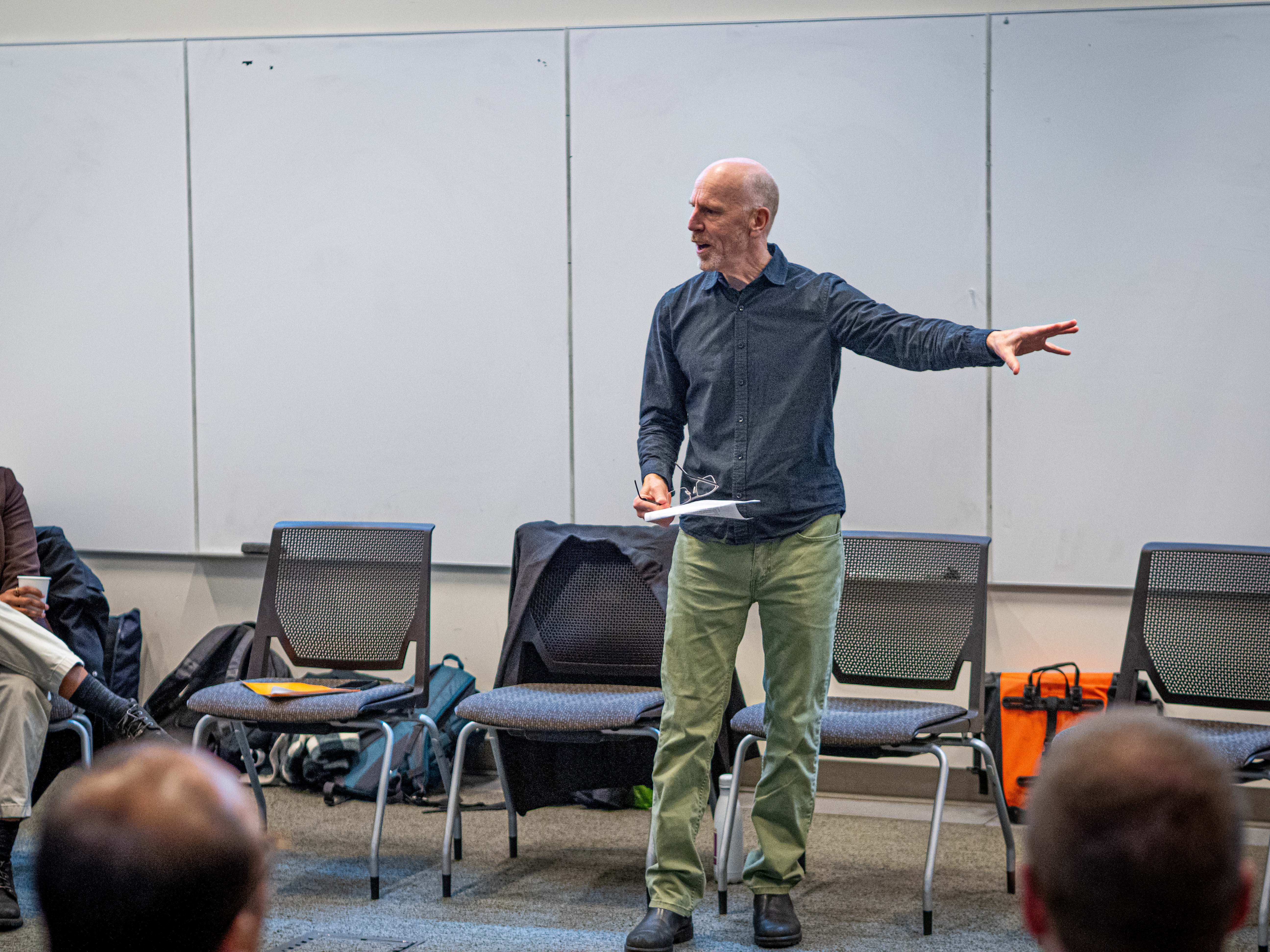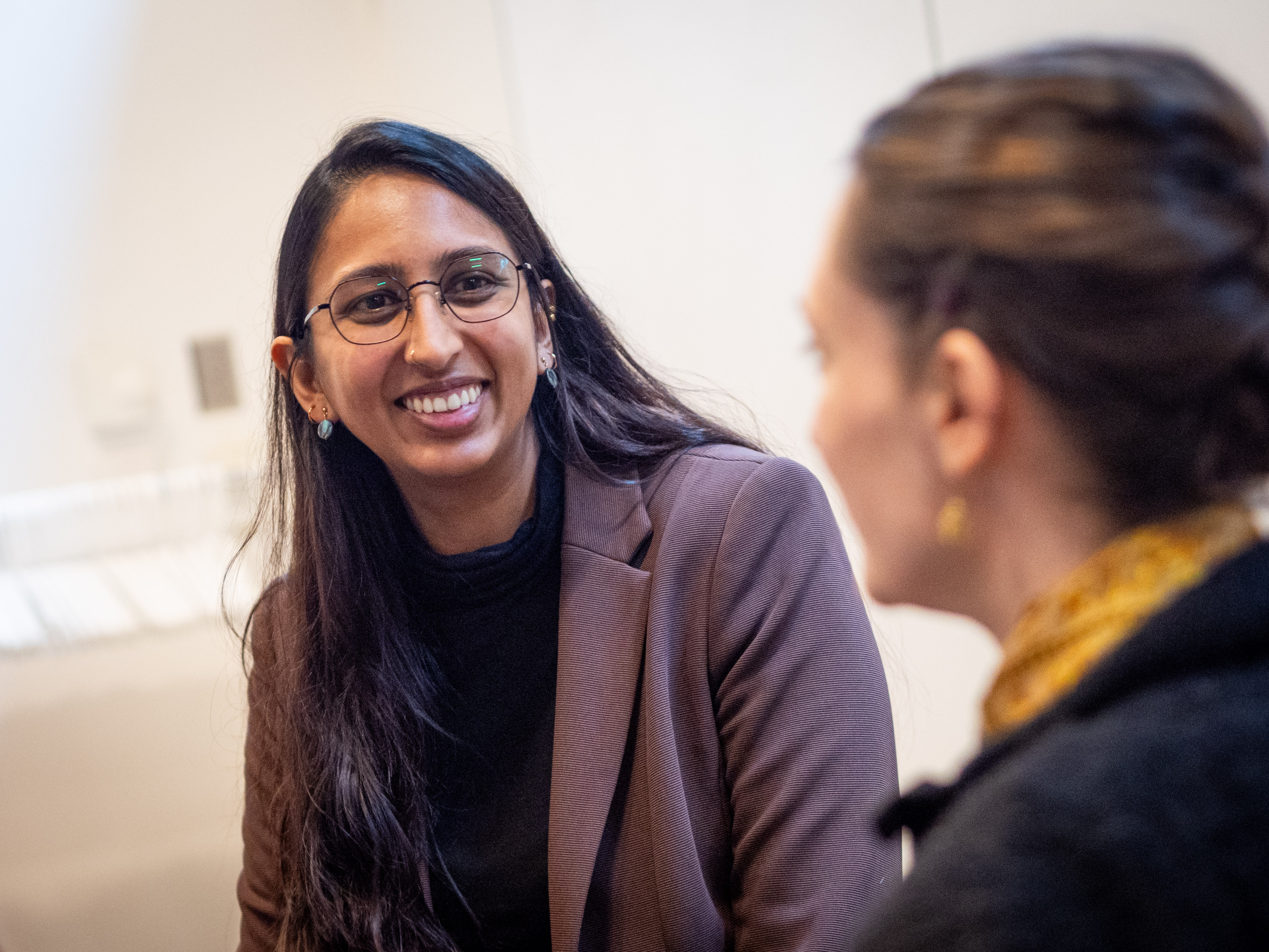On April 9th and 10th, the UBC community came together to explore the intersection of water and climate, highlighting key challenges and opportunities for climate solutions oriented research. Day 1 was held in Kelowna, with our presenting partner the Watershed Ecosystem Research Excellence Cluster. You can view the plenary session "Water Justice in a Changing Climate" here. Day 2 was held in Vancouver with our presenting partner the UBC Sustainability Hub. You can view the plenary session "Climate, Water, Power" here.
Climate, Water and Power - this was the opening mark for the plenary discussion from Day Two of the Climate+Water Symposium.
Moderated by Associate Professor Nadja Kunz, this interdisciplinary panel opened the event by presenting the many ways that our water and energy systems are changing in a time of greater variation in weather conditions, increasing demand, and political instability. Professor Emeritus John Richardson and Associate Professor Werner Antweiler showed how climate change is causing greater variation in weather across the province. Water resources used for hydroelectric generation are increasingly imperilled by the effects of climate change because of reduced snowpacks that act as secondary storage, along with seasonal shifts in precipitation and prolonged drought conditions.
The result is a decrease in the amount of water available to meet ecosystem function as well as meet other demands on water systems including hydropower production. Combined with increasing energy demands to meet heating, cooling, and other needs, the resultant strain on water systems can lead to unintended and unexpected environmental harm and affect the global trade of energy. Dr. Richardson showed how while governments may be tempted to simply make more dams to meet increasing demand, there are greater ecological considerations such as greenhouse gas production, biodiversity harm, increase in pollutants, and problems with sediment that harm the environment and communities alike. Dr. Antweiler mentioned that the renegotiated Columbia River Treaty could have addressed some of these environmental concerns, but with the new US administration, the future of the treaty is up in the air.
Professor Natasha Affolder also cautioned against a sense of urgency in rushing projects to production for the sake of increased energy. She noted that this can come at the cost of sustainability, community consultation, and quality projects, and she urged a focus on changing the background framework and unquestioned systems that can prevent climate and water solutions.
During a question period moderated by Associate Professor Nadja Kunz, the panelists pointed to many ways forward. Dr. Antweiler focused on market-based approaches, such as putting a price on water that reflects water scarcity, and putting a price on water pollution that reflects environmental harm; both of which could help prevent international trade from aggravating problems when water embodied in a traded good is mispriced. Dr. Richardson emphasized how issues around water are critical, nonstationary, and interconnected, requiring a fully interdisciplinary approach to address the complexity of issues and solutions needed. Dr. Affolder ended by saying while no one can predict the future, she sees hope in the important work happening everywhere and in all of us during times of increasing uncertainty.
The second session encouraged participants to loosen their disciplinary silos and embrace connection through interactive theatre activities.
Led by Professor George Belliveau, who leads the Research-based Theatre Cluster, the session started with using somatic techniques to represent each participant’s connection to other participants. Dr. Belliveau and Avril Foster then demonstrated the work of the organization Community Circle through a scripted performance. Through portraying an interaction with a presumptuous, undiplomatic business official who works in delivering water access to communities, Dr. Belliveau’s character was able to explain how Community Circle focuses on listening to communities instead of assuming their needs. By focussing on building relationships and tailoring solutions to the local needs, the community and the organization benefit from a foundation of understanding that makes for better projects. This emphasis on communication carried into the next activity, where participants were invited to describe a project they were working on by using chairs as metaphorical props, following an example set by Rachel Boyer. This allowed for participants to see their work from a new point of view, and gain insights for how to go forward in a way that focussed on connection and collaboration.
The last session of the day had round tables where researchers were invited to share their work at the nexus of climate and water, and discuss ways to improve work that crossed boundaries.
Common themes emerged of barriers to connection, such as lack of awareness of fellow researcher’s work, difficulty sustaining funding for initiatives past initial start ups, barriers to collaboration between the Okanagan and Vancouver campuses as well as between separate research groups, and a lack of Indigenous engagement. To build strong, sustained relationships and collaborations, researchers called for an increased recognition of research connections and community engagement, and greater support for researchers engaging in activities that broaden the range of research approaches. Solutions could include databases like the Climate Researcher Database to introduce researchers to one another, intentional inter-cluster connections like the Disaster Resilience Research Network which can facilitate knowledge sharing, mapping systems of connection that shows networks of support that newcomers can build upon, and increased academic recognition for work that focuses on creating relationships and partnerships, within the university and with community partners. Given the complex, interdisciplinary nature of the crises we find ourselves in, now more than ever we need strengthened community and connection. This Climate+Water Research Symposium hopefully encouraged those interdisciplinary connection, and the Climate Solutions Research Collective will continue acting as a supporter of increased collaboration through events and initiatives like these.
Thank you to all the speakers, moderators, and participants who brought their interest and energy to this event, and to the UBC Sustainability Hub for partnering in hosting this event. To hear more about future events like this, sign up for our newsletter here.
Thank you to those who supported the delivery of Day 2:
- Angelique Pilon, Acting Senior Director UBC Sustainability, for organization support and opening remarks;
- Tim Herron, CIRS Events and Engagement Manager, for facility support and IT production;
- Anthony An, Michelle Hak Hepburn, Claire Kiernan, Oliver Lane, and Sidonie Wittman for event recording; and
- Special thanks to all presenters and hosts.


